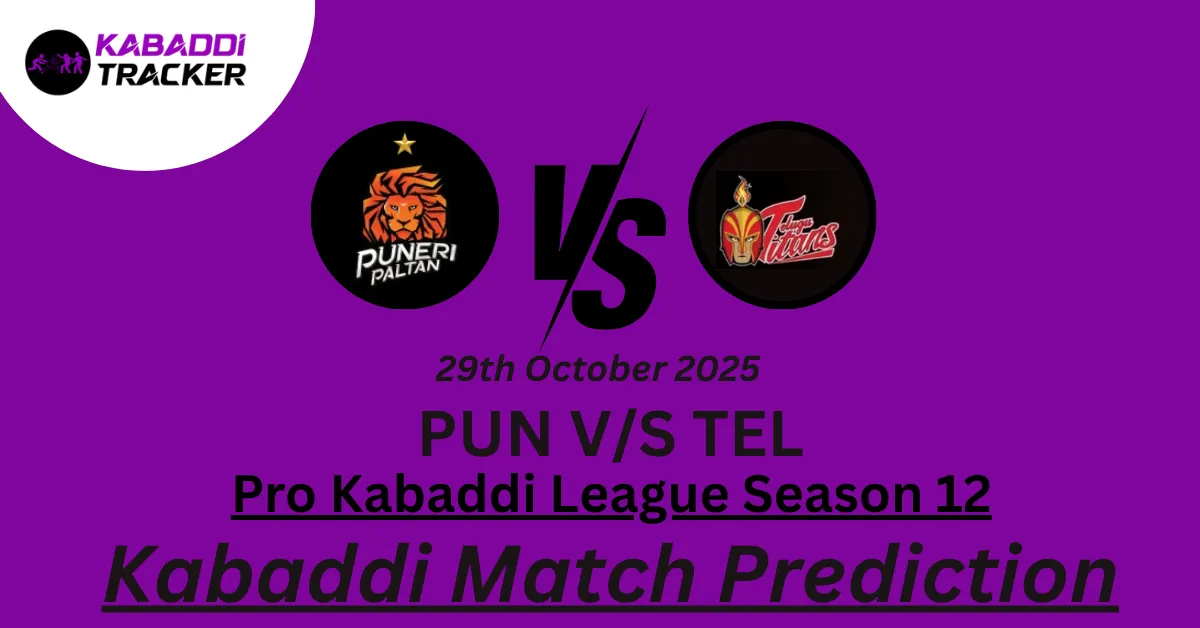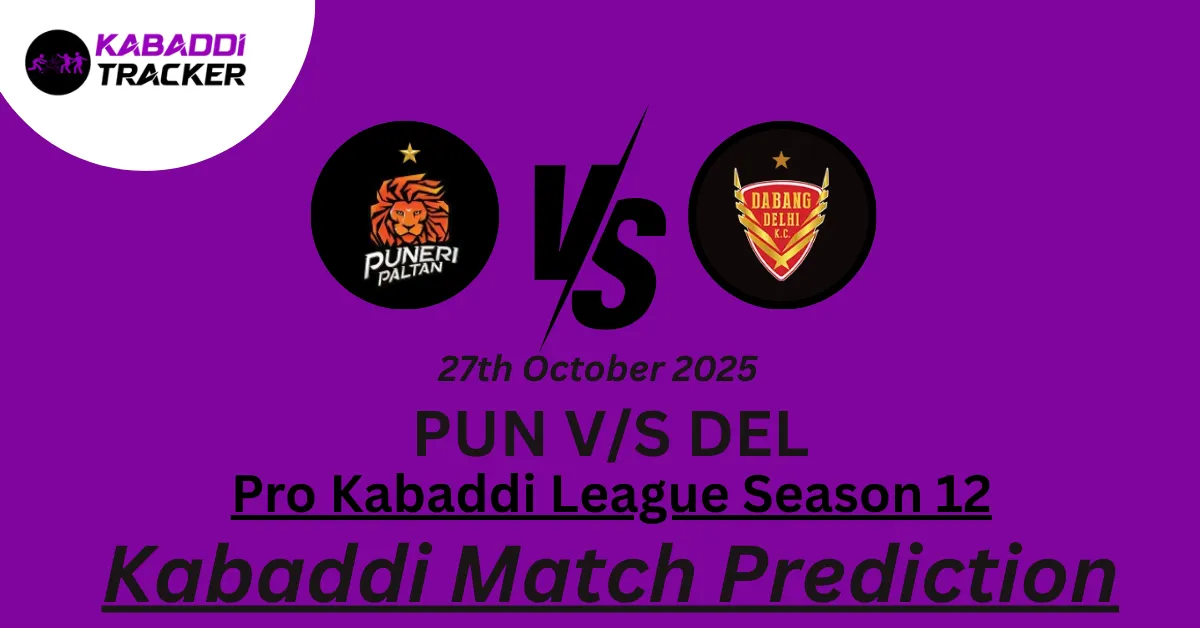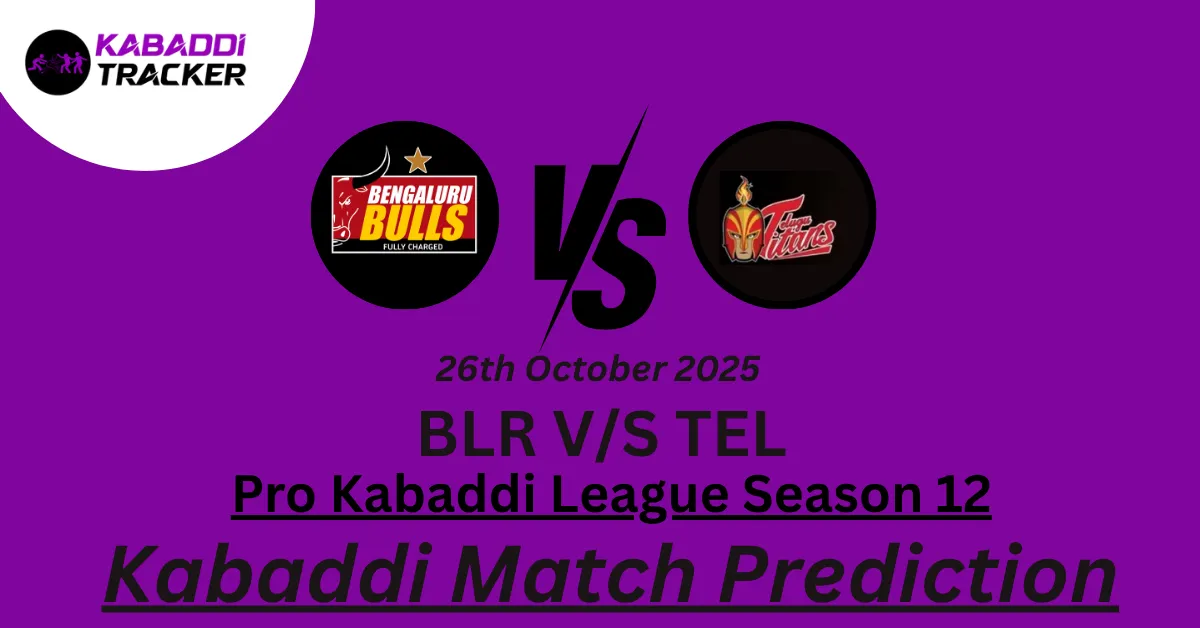Kabaddi: Kabaddi is a team sport performed by two teams of seven players. The goal of the game is for a single offensive player, known as a “raider,” to sprint into the competitor team’s half of the court, touch out as many of their players as possible, and return to their half of the court in 30 seconds without being tackled by the defenders. Each person tagged by the raider wins a point, while the opposite team earns a point for stopping the raider. Players are removed from the match if they are touched & tackled, but they return after each point scored by their team as a result of a tag & tackle.
It is well-known throughout the Indian subcontinent and other Asian countries. Although accounts of kabaddi can be found in ancient Indian history, the game only became famous as a competitive sport in the twentieth century. It is Bangladesh’s national sport. Andhra Pradesh, Bihar, Chhattisgarh, Haryana, Karnataka, Kerala, Maharashtra, Odisha, Punjab, Tamil Nadu, Telangana, & Uttar Pradesh are the Indian states that play it. There are two major disciplines: “Punjabi kabaddi,” also known as “circle styles,” consists of traditional forms of the sport played on a circular field outdoors, and “standard style,” which is played on a rectangular court indoors in major professional leagues & international competitions such as the Asian Games.
Kabaddi History
Kabaddi is a sport that developed from Jallikattu. It was common among the Ayar tribal people of ancient Tamil Nadu’s Mullai geographical region. A player who goes to the opposing team is treated like a Bull. It’s like taming a bull without touching it, as the game known as Sadugudu has been played for centuries, according to Sangam literature. There are also reports of Gautam Buddha playing the game for fun. Another theory of this sport’s history is that it began in Tamil Nadu around 4,000 years ago. The Yadava people were believed to enjoy playing the game.
According to Tukaram’s Abhang, Lord Krishna used to play the game in his childhood. Modern kabaddi combines many variants of the game practiced throughout the Indian subcontinent under various names. The first organized competitions in kabaddi as a competitive sport occurred in the 1920s, and it was added to the program of the Indian Olympic Games in 1938.
The All-India Kabaddi Federation was established in 1950 and was a demonstration sport at the inaugural 1951 Asian Games in New Delhi. These advancements aided in the formalization of the sport, which had previously been played in societies, for real international competition. Kabaddi was introduced to the Asian Games program in 1990 following a demonstration at the 1982 Asian Games in Delhi.
Kabaddi Popularity
Kabaddi is a popular sport throughout the Indian subcontinent. The Amateur Kabaddi Organisation of India (AKFI), created in 1973 and compiled a standard set of regulations, is the governing organization for Kabaddi in India. Pakistan Kabaddi Federation is the governing body for Kabaddi in Pakistan.
Kabaddi is referred to as “Ha-du-du” in Bangladesh. Ha-du-du has no set rules and is played differently in different places. Kabaddi is Bangladesh’s national sport, officially recognized in 1972. In 1973, the Amateur Kabaddi Federation of Bangladesh was established.
The Community of Kabaddi in Iran was founded in 1996 (the same year they joined the Asian Kabaddi Federation) and joined the International Kabaddi Federation in 2001. In 2004, the Iran Amateur Kabaddi Federation was established.
Kabaddi is one of Nepal’s national sports. Kabaddi is played and taught in most Nepali primary schools beginning around the third grade. The British Army also used Kabaddi for recreation, fitness, and recruiting recruits from the British Asian population. Kabaddi was introduced to the United Kingdom by immigrants from Bangladesh, India, Pakistan, Nepal, and Sri Lanka.
Standard Style Graound
In the international team version of kabaddi, two teams of seven players each occupy opposite ends of a court measuring ten by 13 meters (33 ft 43 ft) for men and eight by 12 meters (26 ft 39 ft) for women. Each team has five reserve players available for substitution. The game consists of two 20min halves separated by a 5min halftime break during which the teams switch sides. During each “raid,” an attacking player known as the “raider” sprints into the opposing team’s side of the court and seeks to tag as many of the seven defensive players as possible.
The raider must cross the balk line into the opposing team’s territory and then return to their half of the field without being tackled. (If an attacker hits a defender before reaching the balk line, they do not need to cross the line to earn points and may return to their half of the court.) While raiding, the raider must chant kabaddi loudly to confirm to referees that the raid is completed in a single breath without inhaling. Each attack has a time limit of 30 seconds.
Each defender tagged earns a point; tags can be made with the raider’s hand or foot. When five or more players are on the field, the raider earns a bonus point if they go beyond the bonus line marked in the defending team’s territory. Instead, if the raider is successfully halted (tackled), the opposing side wins a point. All tagged players are removed from the game, but one is “revived” for every point a team scores via a later tag or tackle.
Bonus points do not revive players. Players who cross the boundary are eliminated. An “empty raid” is one in which the raider does not score any points. A “super raid” is a play in which the raider scores three or more points. If a team takes out all seven players on the other team at once (“All Out”), they gain two extra points, and the players are reintroduced into the game.
Circle Style Ground
The amateur federation recognizes four significant varieties of Indian kabaddi. In Sanjeevani kabaddi, one player is revived for each out player on the opposing team. The game lasts 40 minutes, with a five-minute break in between halves. Each team has seven players, and the team that exceeds the opposing team earns four extra points.
Each side has seven players in Gaminee style, and a player who is put out must remain out until all his team members are out. A point is awarded to the team that successfully outs all opponents’ players. The game continues indefinitely until five or seven such points are secured.
In the time frame rule, the Amar style is similar to the Sanjeevani form, except a player who is declared out remains on the court while play continues. A team wins one point for each opponent that touches “out.” Punjabi kabaddi is a variant played on a 22-metre-diameter (72-foot-diameter) circular pitch.
Also Read: How many countries play Kabaddi Has Kabaddi ever been played in the Olympics
Kabaddi World Cup
The Kabaddi World Cup is an indoor international Kabaddi competition held in a standard format by the International Kabaddi Federation (IKF) and contested by men’s and women’s national teams. The competition has previously been held in 2004, 2007, and 2016. India has won each of the three events. The first Kabaddi World Cup for Women was held in India in 2016. The current competition structure is a round-robin group stage with five teams divided into two pools, with the first and second-place finishers in each group going to the semi-finals.
Kabaddi at the Asian Games
Kabaddi was initially played as a demonstration event at the Asian Games in 1951, then as a medal event for the first time in 1990. From 2002 until 2014, the Indian national team won every men’s and women’s kabaddi competition at the Asian Games. Iran became the 1st country other than India to win gold medals in kabaddi at the 2018 Asian Games, with India’s men’s team taking bronze and India’s women’s team losing to Iran for silver.
Pro Kabaddi League
The Pro Kabaddi League (PKL) is an Indian men’s professional Kabaddi competition. It debuted in 2014 & is currently broadcast on Star Sports. Season 8 was postponed owing to the COVID-19 pandemic, and the season began on December 22, 2021.
The popularity of the Kabaddi competition during the 2006 Asian Games prompted the league’s formation. The Indian Premier League inspired the competition’s format. The PKL operates on a franchise concept, and the league’s first season was held in 2014, with eight teams paying entry fees of up to US$250,000 to join.
Many questioned whether the Pro Kabaddi League would be successful, pointing out that many leagues were aiming to replicate the IPL’s financial model and success and that, unlike cricket, Kabaddi had fewer well-known stars. However, it was also recognized that Kabaddi was frequently played in grassroots community settings and could attract a diverse range of rural and metropolitan audiences for advertisers to target if the league became popular.
The first season drew 43.5 crores (435 million) viewers, trailing the 55.2 crores (552 million) of the 2014 Indian Premier League, while the first season final between Jaipur Pink Panthers and U-Mumba drew 8.64 crores (86.4 million). The Pro Kabaddi League’s broadcaster, Star Sports, later announced in 2015 that it would buy a 74% ownership in the league’s parent firm, Mashal Sports.
The Pro Kabaddi League introduced four new clubs and modified its system to divide teams into two divisions known as “zones” for the 2017 and 2018-19 seasons.
Pro Kabaddi League Format
The rules of the Pro Kabaddi League are similar to the indoor team version of Kabaddi but with added rules to encourage more scoring. Kabaddi is a team sport performed by two teams of seven players each.
The goal of the game is for a single attacking player, known as a “raider,” to run into the opposing team’s half of the court, touch out as many of their defenders as possible, and then return to their half of the court in a single breath, all without being tackled by the defenders. Each person tagged by the raider wins a point, while the opposite team earns a point for stopping the raider. Players are removed from the game if they are touched or tackled, but they are brought back in for every point scored by their team as a result of a tag and tackle.
Playing two “empty” raids in a row will result in a “Do or Die” situation in which the raider must score a point or be ruled out.
When a defensive team has three or fewer players left, tackles are referred to as “Super Tackles,” they are worth two points instead of one.
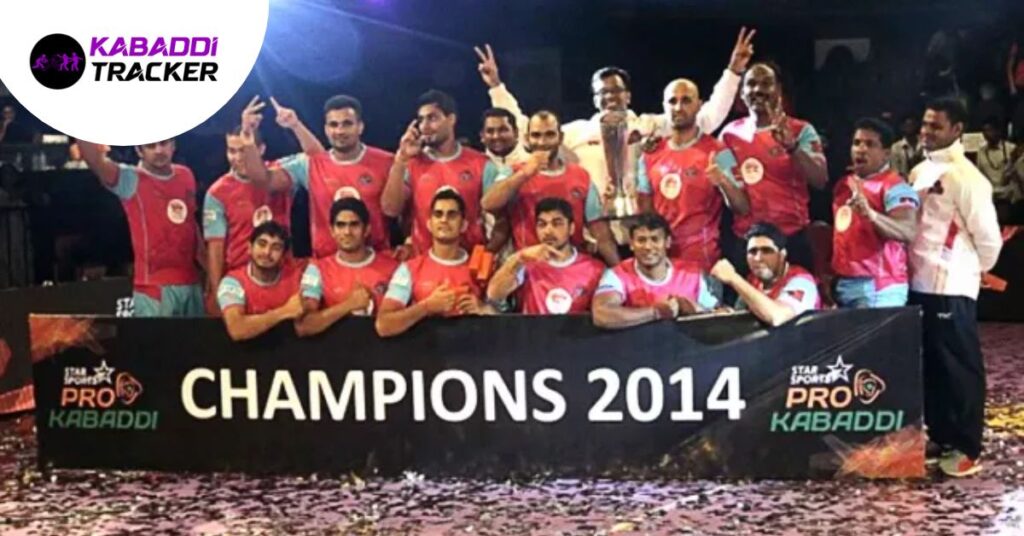
Pro Kabaddi League Season 1
On May 20, 2014, the first signing and auction of players for the eight teams took place in Mumbai. Rakesh Kumar, India’s national kabaddi captain, was the most expensive player purchased by the Patna Pirates for Rs 12.80 lakh. The Telugu Titans franchise purchased Deepak Niwas Hooda of the Sports Authority of India for Rs.12.60 lakh. Tae Deok Eom was the Patna franchise’s highest-paid overseas player, signing for 7 lakh.
The season lasted from July 26 to August 31, 2014. There were two round-robin matches, two semifinals, a third-place game, and a final game. There were to be 56 games in the first round and four in the playoff stage, for 60 games. The initial edition featured eight teams. The first game occurred on July 26 between U Mumba and Jaipur Pink Panthers, and the final happened on August 31 in Mumbai. The inaugural Pro Kabaddi League was won by Jaipur Pink Panthers, who defeated U Mumba 35-24.
Pro Kabaddi League Season 2
Season 2 of Star Sports Pro Kabaddi ran from July 18 to August 23, 2015. There were 60 matches in total, including two semifinals, a third-place play-off, and a final. The first game occurred on July 18 between U Mumba and the Jaipur Pink Panthers, and the last on August 23 in Mumbai between U Mumba and the Bengaluru Bulls. U Mumba defeated Bengaluru Bulls 36-30 to win the 2015 Pro Kabaddi League season. U Mumba were first, Bengaluru Bulls were second, and Telugu Titans were third in the league.
Pro Kabaddi League Season 3
Season 3 of Star Sports Pro Kabaddi had two editions. Sanjay Gupta, the CEO of Star India, announced that Star Sports Pro Kabaddi intends to expand Pro Kabaddi, a 5-week and 10-week event, by holding two annual editions. The event will be held twice in 2016, once in January-February and once in June-July. It also had eight teams. Patna Pirates defeated U Mumba by three points in the final in Delhi. This season, Puneri Paltan finished third.
Pro Kabaddi League Season 4
The fourth season occurred from June 25 to July 31, 2016, with eight existing teams participating. Patna Pirates won the championship over Jaipur Pink Panthers. Women’s Kabaddi Challenge (WKC), the first professional kabaddi league, was also launched in Season 4. The first season saw three teams compete for the WKC championships: Ice Divas, Fire Birds, and Storm Queens. Patna Pirates defeated Jaipur Pink Panthers in the men’s final to win the Pro Kabaddi League title for the second time.
Pro Kabaddi League Season 5
The fifth season of the Pro Kabaddi League included 12 teams, including new teams from Uttar Pradesh, Haryana, Tamil Nadu, and Gujarat. Haryana Steelers is the team’s name from Haryana, owned by JSW Sports. Sachin Tendulkar co-owns the Tamil Thalaivas team in Tamil Nadu. The Uttar Pradesh team is known as UP Yoddha and is owned by the GMR company, whereas the Gujarat team is known as Gujarat Fortune Giants and is owned by Gautam Adani.
The new season’s auctions were held in May, after which the existing teams were allowed to keep one player each. Over 400 players were auctioned off, with the 12 teams spending 46.99 crores.
Season 5 of the Pro Kabaddi League began on July 28, 2017. The most expensive auction pick was raider Nitin Tomar, purchased by the Uttar Pradesh team for 93 lakh. Following in second place was Rohit Kumar, who the Bengaluru Bulls selected for a fee of 81 lakhs. South Korean Lee Jang-kun was the most expensive foreign player, having been retained by the Bengal Warriors for 80.3 lakhs.
Regarding geographical scope and duration, the new season was set to be the largest league event in Indian sports history. It had 138 matches lasting across 11 states over 13 weeks.
KBD Juniors, a children’s Kabaddi tournament, was also organized amongst schools in the cities where the matches were held. Patna Pirates defeated Gujarat Fortune Giants in the final by a score of 55-38, with Man of the Tournament Pardeep Narwal stealing the show with 19 raid points against the Fortune Giants defense for the first time in the tournament. Pooja Bhamrah hosted the finale’s award ceremony. Pardeep Narwal was named the winner of the finale.
Pro Kabaddi League Season 6
The 2018 season is the sixth variation of the Pro Kabaddi League, with 12 teams participating. The auctions for the new season were held, and Haryana Steelers paid 1.51 crores for Monu Goyat, who became the highest-paid player in Pro Kabaddi league history. Fazel Atrachali of Iran is the most expensive foreign player this season. U Mumba paid one crore for him.
Bengaluru Bulls defeated Gujarat Fortune Giants in the final 38-33, with Man of the Tournament Pawan Kumar Sehrawat stealing the show with a record 22 raid points against the youthful Fortune Giants defense. Gujarat Fortune Giants have fallen in the finals for the second time. Randhir Singh, the Bengaluru Bulls’ coach, was overjoyed that his side had finally won the competition after two disappointing seasons. On the other side, Manpreet Singh, the coach of the Gujarat Fortune Giants, regretted the potential to win the championship after losing two successive finals.
Pro Kabaddi League Season 7
The 2019 season of the Pro Kabaddi League consists of 12 teams for the seventh time. On April 8 and 9, auctions for the new season occurred in Mumbai. The teams spent over 50 crores to get 200 players. Siddharth Sirish Desai became the season’s most expensive signing after Telugu Titans outbid everyone else for him at 1.45 crore. This season’s most expensive foreign player was Iranian Mohammad Esmaeil Nabibakhsh, purchased by Bengal Warriors for 77.75 lakh. The organizers have dubbed this season the ‘Most Toughest Season’ because the previous season’s zone system has been scrapped, and each side will play every other team twice. The top six clubs will advance to the playoffs. The top two teams automatically advance to the semi-finals, while the remaining four compete in elimination games.
Dabang Delhi and Bengal Warriors won the semi-finals and advanced to the final for the first time. Bengal Warriors defeated Dabang Delhi 39-34 in the final to win their first Pro Kabaddi League title. Several records were broken throughout the season. Pardeep Narwal became the first player in the Pro Kabaddi League to collect 1000 points. Naveen Kumar had 21 straight Super 10s and a total of 22. At the same time, Pawan Sehrawat had the most individual points (39) in a game versus Haryana Steelers. For the first time this season, three raiders surpassed 300 raid points. Among defenders, Neeraj Kumar of Patna Pirates had the most tackle points (11) in a game, matching Mohit Chillar’s record.
Pro Kabaddi League Season 8
The Pro Kabaddi League’s eighth season will occur in 2021-22. The season started on December 22, 2021. The traditional traveling caravan concept was replaced by one place hosting all of the season’s games. Initially advertised as Kanteerava Indoor Stadium in Bangalore, the venue was later changed to the Sheraton Grand Hotel & Convention Center in Whitefield, Bangalore. Dabang Delhi won their 1st PKL title after defeating Patna Pirates in the final.
Naveen Kumar of Delhi made history by winning 2 MVP awards. Bengaluru captain Pawan Sehrawat successfully defended his best raider title for the 2nd season. Sehrawat completed the campaign with 18 super raids & 304 raid points. Mohammadreza Chiyaneh of the Patna Pirates won the top defender award for the second season. With 10 High 5s and 89 tackle points, the rookie set a new PKL record. Pune’s Mohit Goyat was named the best new young player.
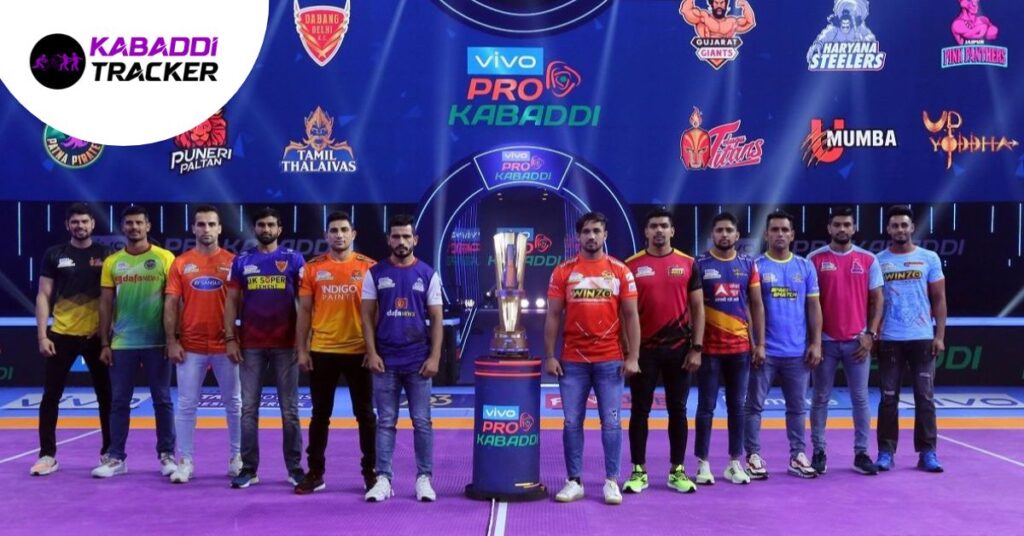
Pro Kabaddi League Season 9
The Pro Kabaddi League’s ninth season begins in 2022. The season’s auction took place on August 5-6, 2022. Pavan Kumar Sehrawat was the most expensive transfer of the season, purchased by Tamil Thalaivas for Rs 2.26 crore, a PKL record. The season began on October 7, 2022, and consisted of three legs, each staged at a separate site (Kanteerava Indoor Stadium, Shree Shiv Chhatrapati Sports Complex, and Gachibowli Indoor Stadium). Jaipur Pink Panthers defeated Puneri Paltan in the final, 33-29, to become the second team, after Patna Pirates, to win multiple Pro Kabaddi League titles.
Pro Kabaddi League Viewership
According to data from the first two weeks, Star Sports Pro Kabaddi viewership on TV increased roughly 56% over the previous year. During the inaugural season, viewership was 43.5 crore (435 million), ranking second in India, following IPL viewership of 56 crore (560 million). Online viewership reached 1.3 crore unique visitors, 18.5 times more than last year’s 7 lakh unique visitors. The third season, which premiered on January 30, saw an increase in viewership, with the first week ratings 36% higher than the previous season’s week one audience.
Indo International Premier Kabaddi League
The first edition of the IIPKL took place on May 13 in Pune, India. The Bangalore Rhinos won the inaugural season championship.
Super Kabaddi League
Super Kabaddi League (SKL) is a Pakistani professional kabaddi league. The first season occurred in Lahore from May 1 to May 10, 2018. This league operates on a city-by-city franchise concept. The players’ draft, held on April 23, 2018, in Lahore, featured over 100 Kabaddi players from Pakistan and internationally. The inaugural edition featured international players from Sri Lanka, Iran, Bangladesh, and Malaysia.
Super Kabaddi League Opening Ceremony
The league’s formal beginning ceremony occurred on May 1, 2018, at the Alhamra Cultural Complex in Lahore. Film actress-turned-director-turned-producer Reema Khan hosted the first event. During the ceremony, singers Nabeel Shaukat Ali and Sara Raza Khan performed. This was the first time in the country that a sporting event of this scale had been organized.
The event was open to the public. It was attended by people from all walks of life, team owners, Pakistan Kabaddi Federation executives, and many others. The ceremony featured multiple performances, including one by the Bakhshi Brothers, who also sang one of Season 1’s songs.
Super Kabaddi League Finale
Gujrat Warriors won the inaugural Super Kabaddi League with a score of 38-26 over Faisalabad Sherdils in the final game. Tehseen Ullah of the Gujrat Warriors was named Man of the Final. Nasir Ali, the captain of Faisalabad, was named Player of the League. The winning team received a cash prize of Rs. 1 million, while the runners-up received Rs. 500,000.
Asian Kabaddi Championship
The Asian Kabaddi Championship is a traditional Kabaddi tournament. It initially took place in 1980. The 11th tournament was held in the Republic of Korea, where India earned its eighth medal.
Dubai Kabaddi Masters
The 2018 Dubai Kabaddi Masters was a 6-nation Kabaddi Masters series hosted in the United Arab Emirates from June 22 to June 30, 2018. The competition was also in its initial year. This was the first international kabaddi sporting event in the UAE. The defending world champions India, Pakistan, Iran, the Republic of Korea, Argentina, and Kenya competed in the competition. India was considered the heavy favorite to win the inaugural Dubai Kabaddi Masters. The tournament was held at Dubai’s Al Wasl Sports Club.
The event began with a match between arch-rivals India and Pakistan, the first between these two sides since the 2016 Kabaddi World Cup. In the first match, India defeated Pakistan 36-20.
The Pakistan team was supposed to arrive in Dubai on Thursday, June 21, before the tournament’s opening match on Friday, June 22, but their travel was delayed due to visa complications. As part of their preparation for the event, the Indian Kabaddi team played a warm-up match against their Asian rivals, South Korea.
Rajyavardhan Singh Rathore, the current Indian Union sports minister and a former professional shooter, was invited as the primary guest on the day of India’s first match against Pakistan.
The International Kabaddi Federation, in collaboration with the Dubai Sports Council and the Star India network, organized the inaugural Dubai Kabaddi Masters. Star India was given the broadcast rights, and the series aired on the Star Sports Network. India defeated Iran 44-26 in the final to win the inaugural Dubai Kabaddi Masters competition.
Junior World Kabaddi Championship
The first Junior Kabaddi World Championship was held at Kish Island, Iran, from November 11 to 14, 2019. There were 13 teams in all. Iran won the event by defeating Kenya 42-22 in the final. Team India did not attend this competition.
Yuva Kabaddi Series
Yuva Kabaddi Series is a long-term event for India’s youth players, restricted to players under the age of 23 and weighing less than 80 kg. The first Yuva Kabaddi Series was held in Jaipur in June 2022. In 2022, three tournaments were held: the Summer Edition in Jaipur, the Monsoon Edition in Ranchi, and the Winter Edition in Pondicherry; and two in 2023: the KMP YKS in Maharashtra (which Ahmednagar won) and the Summer Edition in Mysore. For the first time in Indian kabaddi history, players from the North East will compete in a competition of this scale.
European Kabaddi Championship
In 2019, Scotland hosted the first European Kabaddi Championship. Poland won the event by defeating Holland in the final match. Poland defeated Holland 47-27. The World Kabaddi Federation arranged the 2nd edition, which was held in Cyprus in 2021. Poland defended their championship in the final, defeating hosts Cyprus 29-15. The 3rd edition will be held in Italy in 2022.
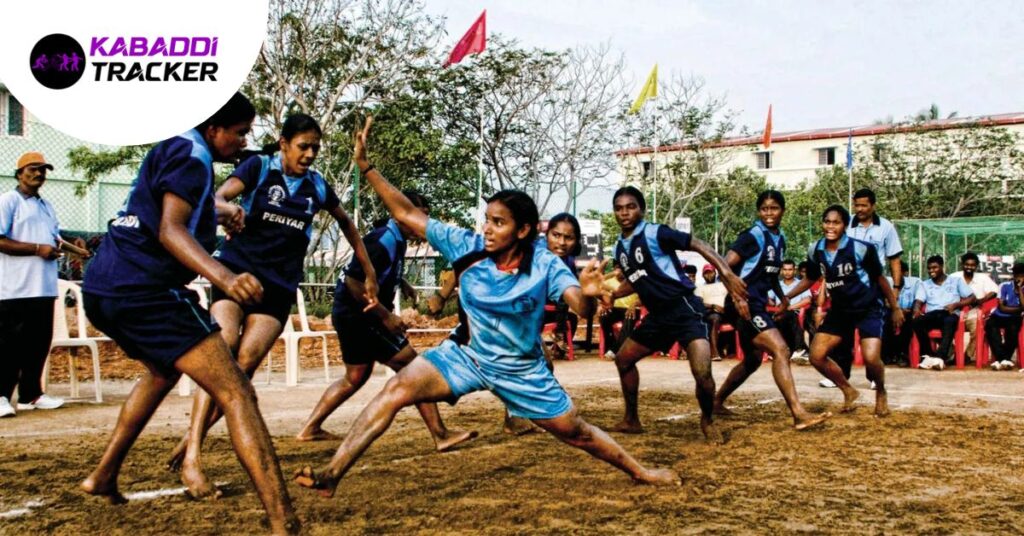
Women’s Kabaddi League
The Women’s Kabaddi Competition (WKL) is a professional Indian kabaddi competition that began in 2023. Its first season saw eight teams competing in Dubai, with Uma Kolkata defeating Punjab Panthers in the final.
Women’s Kabaddi League Team
- Delhi Dynamites
- Bengaluru Hawks
- Gujarat Angels
- Great Marathas
- Haryana Hustlers
- Punjab Panthers
- Rajasthan Riders
- Uma Kolkata
Kabaddi Skills & Moves Name
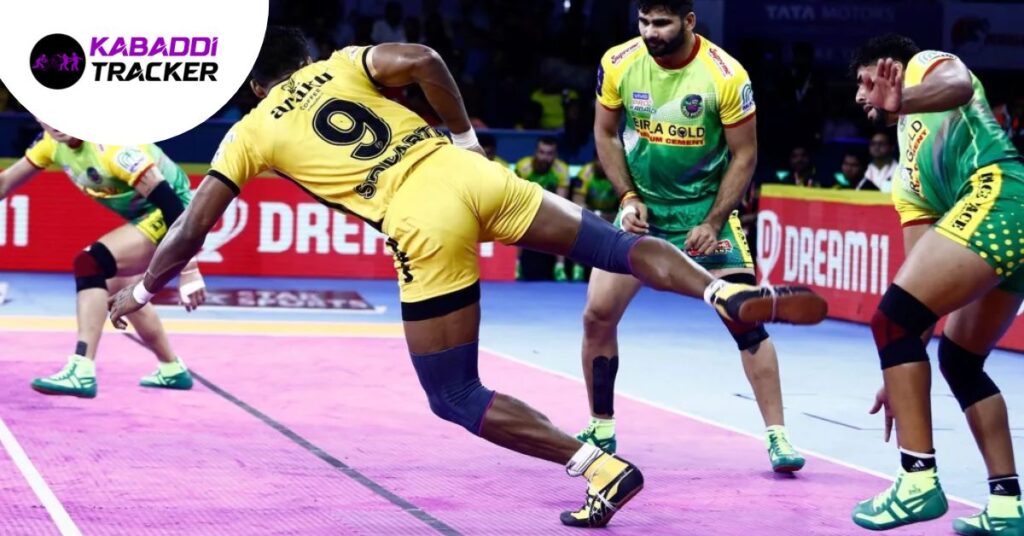
Offensive Skills
Raiders use attacking talents in the opposing half to make contact with opponents and score points for their team. Toe touch, running hand touch, lion jump, back kick, sidekick, and dubki are some of the most popular attacking skills of kabaddi.
Toe Touch: Toe touch is a popular kabaddi skill in the raider’s set, in which the raider tries to contact the defender with his toe and score a point. The success of this move is heavily hinged on the raider’s quickness and unpredictability in doing it before the defender anticipated the move.
Sidekick: Another highly powerful kabaddi move for raiders is the sidekick, in which the raider attempts to touch the defender by kicking sideways without losing his balance. To perform this technique properly, a raider must have practiced it to perfection to retain his body balance and center of gravity.
Lion Jump: Lion Jump, popularized by Pawan Sehrawat in Vivo Pro Kabaddi, needs incredible force and drive generated by the raider’s legs. A kabaddi raider attempts a lion jump to avoid the defenders and reach the midline. This is commonly regarded as the most athletic move in the game, and it is extremely tough to get right, much alone perfect.
Hand Touch: Hand touches are one of the most important kabaddi offensive skills for any raider since they test their proactivity and reflexes. A raider in kabaddi should be able to perform stooping hand touches, turning hand touches, and running hand touches.
Dubki: A Dubki technique needs extraordinary timing and quick instincts to execute. In a dubki, the raider avoids the chain tackle by ducking under the defenders’ spread arms and scores a point.
Back Kick: Backkick is one of the most creative techniques in kabaddi, in which the raider fools the defense by displaying his back and attempting to kick backward for a touchpoint. It’s also known as a ‘ mule kick’ in various parts of the world.
Defensive Skills
Defending in kabaddi requires more than physical force, core strength, and brave tackles. The defenders attempt certain kabaddi moves to capture the raiders. Kabaddi defensive abilities such as ankle hold, thigh hold, waist hold, block, sprint, and chain tackle require good timing and strength to be performed cleanly.
Thigh Hold: As the name suggests, in this kabaddi defensive skill, the defender tries to grab the raider’s thighs and stop him before he reaches the midline. Precision is essential when the defender attempts to hold the raiders’ thighs with both hands.
Waist Hold: Another kabaddi defensive skill that involves pure strength from the defender. Waist hold is a kabaddi move in which the defense tries to raise the raider in mid-air by gripping his waist and pinning him to the mat. Rann Singh and Sandeep Narwal are two outstanding situations that occasionally demonstrate this kabaddi technique.
Ankle Hold: Star defenders like Ravinder Pahal and Surender Nada have shown an outstanding ankle hold to the rest of the globe. Ankle holds, and diving ankle holds depend on the defender’s timing and anticipation as he attempts to seize the raider’s ankle and prevent him from crossing the midline.
Block: The move that takes physical and mental strength to commit to this high-risk, high-reward motion. Waiting for the raider to move deep inside the half, the defender blocks his path with his entire body. The defender must be in the proper position before launching the block.
Chain Tackle: Chain Tackle is one of those kabaddi methods that requires a team effort to prevent the raider from crossing the midline. A successful chain tackle requires two or more defenders to coordinate and pounce on the raider. To execute this move correctly, coordination and teamwork are required.
Dash: One of the most impressive kabaddi skills is rushing a raider off the court or lobby. This kabaddi technique requires a defender to use raw power and strength to push the raider off the court and get a point for his team. Cover and Corner defenders usually attempt this technique on the mat.
Kabaddi’s National Sports Awards
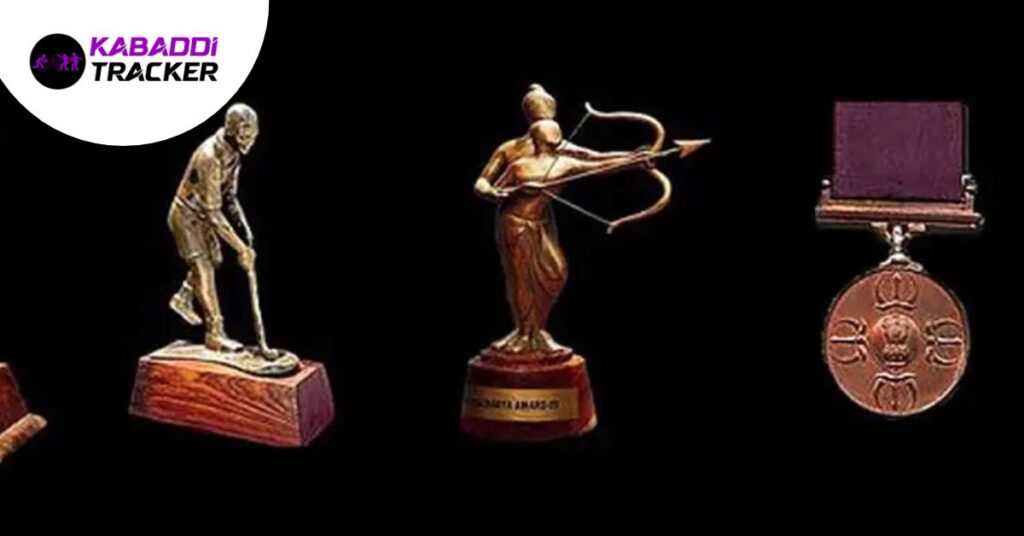
Arjuna Award
The Arjuna Award is presented to recognize excellent athletic achievements. The Arjuna Award has been given to 36 kabaddi players, both men and women. In 1972, Sadanand Shetye became the first kabaddi player to get the Arjuna Award. With Indian Railways, the Maharashtra all-rounder won 12 Senior National Championships. Meanwhile, Shakuntala Khatavkar was the first woman kabaddi player to receive the Arjuna Award in 1978.
Dronacharya Award
The Dronacharya Award honors coaches’ achievements in driving a sport or an athlete to the top. E. Prasad Rao, the chief coach of the Indian national kabaddi team that won gold at the 1990 Asian Games, was the first Dronacharya Award in 2002. Former Jaipur Pink Panthers coach Balwan Singh & Haryana Steelers Season 5 coach Rambir Singh Khokhar have also been recognized for their coaching excellence. Kishan Kumar Hooda, head coach of Dabang Delhi K.C., received the Dronacharya Award in 2020.
Dhyan Chand Award
The only two kabaddi players to get the Dhyan Chand award, a career achievement sporting honor, are Gujarat Giants head coach Manpreet Singh and senior Indian national kabaddi player Shamsher Singh.
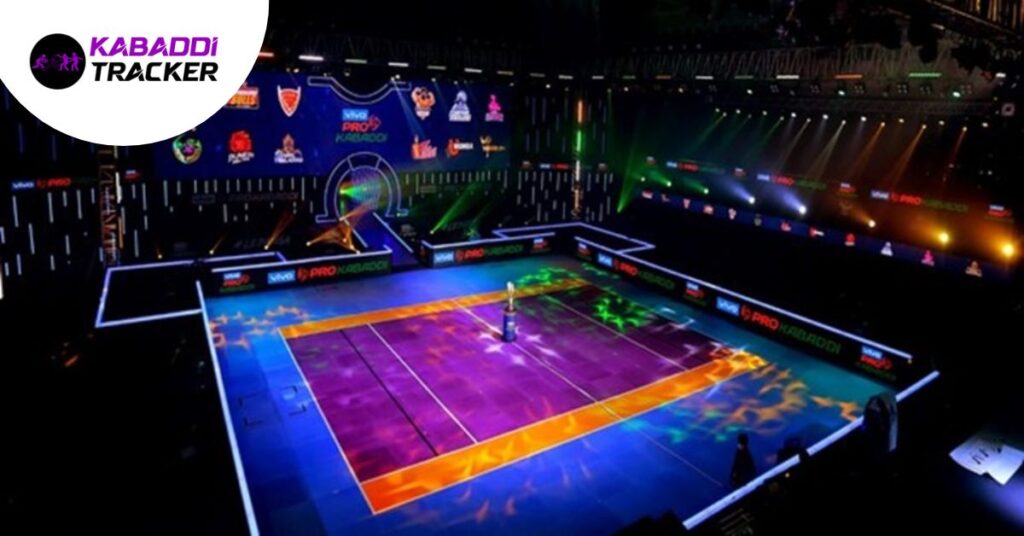
Top 10 Kabaddi Stadiums in The World
Kabaddi is a physically challenging sport that requires stamina as well as agility. It also requires excellent strategic thinking because players must respond swiftly and make decisions on the fly. Kabaddi is a fun way to stay fit and is gaining popularity worldwide.
1: Berlin, Germany: Mercedes-Benz Arena
So far, one match has been played in the Kabaddi Masters 2020. The first game featured Germany and Austria. The Kabaddi Stadium in Germany is a tiny but well-equipped arena in a big city with a growing Kabaddi fan following. In 2020, this stadium will host the international championship Kabaddi Masters.
2: Auckland, New Zealand: Spark Arena
Despite its small dimensions, the Kabaddi Stadium in New Zealand is a well-kept arena in a big city with a rising Kabaddi fan following. In 2019, it hosted the Kabaddi Masters, an international tournament. Only one match has been played, and it was a Kabaddi Masters match between New Zealand and Australia in 2019. So far, one match has been played in the Kabaddi Masters 2020. The first game featured Germany and Austria. The Kabaddi Stadium in Germany is a small but well-equipped arena in a big city with a growing Kabaddi fan following. In 2020, this stadium will host the international championship Kabaddi Masters.
3: Seoul, South Korea: Jamsil Indoor Stadium
One match was held at the South Korean Kabaddi Stadium. This stadium, located in a big city, is well-equipped and has a rising kabaddi fan base. In 2018, it hosted the Asian Kabaddi Championship, an international tournament—the Asian Kabaddi Championship 2018 match between South Korea and Japan.
4: Singapore: Singapore Indoor Stadium
The first match in the Kabaddi Masters 2017 was contested between Singapore and Malaysia, and two more matches have been played since then. Although tiny, the Kabaddi Stadium in Singapore is well-maintained and located in a large city with a rising Kabaddi fan base. Several international competitions, including the famed Kabaddi Masters, have been chosen for this venue.
5: Los Angeles, California, USA: StubHub Center
Los Angeles’ Kabaddi Stadium is a small but well-equipped facility in a major city with a rising Kabaddi fan base. It has held several international tournaments, including the Kabaddi World Cup, with great success.
6: Toronto, Canada: Coca-Cola Coliseum
Four matches were played at the Kabaddi Masters 2020. The first match was Canada against the United States. The event was held at the Kabaddi venue in Toronto, a smaller but well-maintained venue in a major city with a growing Kabaddi fan base. Previously, this stadium had some international tournaments, including the Kabaddi Masters.
7: Birmingham, England: Arena Birmingham
Four matches were played at the Kabaddi Masters 2020. The first match was Canada against the United States. The event was held at the Kabaddi venue in Toronto, a smaller but well-maintained venue in a major city with a growing Kabaddi fan base. Previously, this stadium had some international tournaments, including the Kabaddi Masters.
8: Sydney, Australia: Qudos Bank Arena
Ten matches were contested during the 2016 Kabaddi World Cup. The opening match played Australia against India. The Kabaddi Stadium in Sydney, a small but well-equipped facility located in a major city with a growing Kabaddi fan base, hosted this tournament and has previously hosted several international competitions, including the Kabaddi World Cup.
9: Sharjah, United Arab Emirates: Al Wasl Sports Club
The first match was played by the UAE against Iran. The competition was held at Sharjah’s Kabaddi Stadium, known for its well-kept facilities and energetic crowd. Previously, this stadium had some international tournaments, including the Kabaddi Masters.
10: Kuala Lumpur, Malaysia: Axiata Arena
The Asian Kabaddi Championship 2017 included 20 matches, the first of which played Malaysia against Thailand. The Kabaddi Arena, where the tournament was held, is a modern venue with all the facilities required for a high-level sporting event. In addition, it is located in a lively city with a significant number of kabaddi fans, making it a perfect spot for international tournaments.

